The Colorado Mountain Dog (CMD) could be just what you need if you want a dog that provides great security for your cattle and the affection of a devoted family friend. Small farms, homesteads, and eco-tourism businesses are choosing these dogs, known for their quiet demeanor and keen guarding instincts, because they fit their environment. The Colorado Mountain Dog finds the ideal mix between a guardian and a gentle buddy with their capacity to guard while also being approachable and pleasant. This book will explore the breed’s background, unique characteristics, care needs, and much more to help you decide whether the Colorado Mountain Dog would be the best complement to your house and yard.
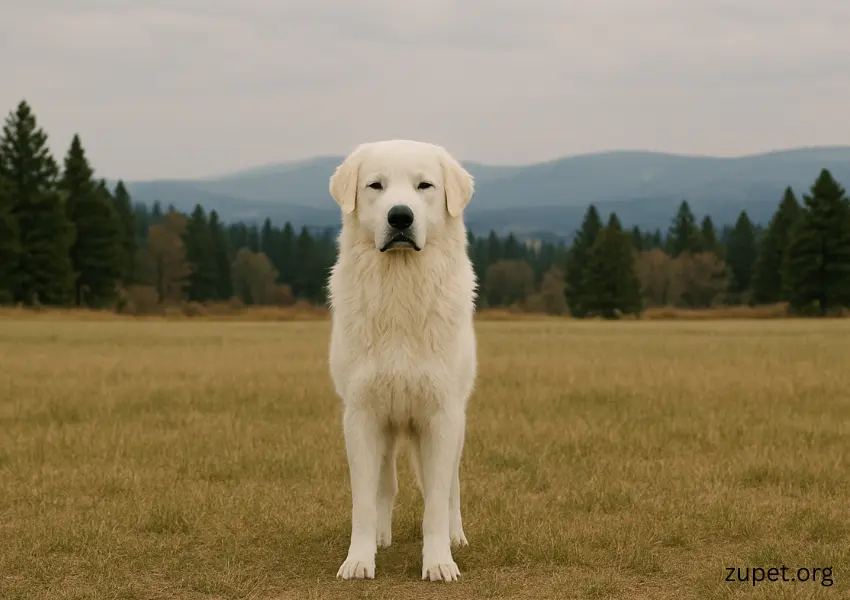
Origin and History:
Wendy Francisco originally crossed the Colorado Mountain Dog in 2008 in an attempt to produce a dog ideal for small-acreage farms. She began with a foundation dog of Great Pyrenees and Anatolian Shepherd. Key inspiration for the development of this breed was Caspian’s attitude, which was amiable but protective toward guests.
The original aim was to develop a livestock guardian dog (LGD) that would not only guard animals but also be less prone to stray or bark too much. The breed we know today sprang from this need for a calm, less energetic dog.
Breed Traits and Characteristics:
A mix of several well-known LGD breeds, Colorado Mountain Dogs combine the Great Pyrenees, Anatolian Shepherd, and others like the Maremma and Kuvasz. These dogs were especially developed to have strong guarding instincts, devoid of excessive aggressiveness or barking directed against guests.
The Colorado Mountain Dog stands out mostly for its unusual mix of qualities. Though they are placid and able to relax when there is no immediate threat, they are athletic and can defend cattle well. The Colorado Mountain Dog is more selective in its behavior than other LGDs that might wander or bark at every strange sound;
it only becomes active as needed. This makes them especially ideal for smaller farms or residences where over-barking can cause problems. Their cool head also permeates their contacts with young people. Though their size means they should always be watched around young children, Colorado Mountain Dogs are usually kind, calm, and friendly with youngsters. They are ideal family pets.
Appearance:
Colorado Mountain Dogs are large, majestic animals. Rising to 34 inches tall, they have a powerful, well-proportioned frame. Their coats are generally white, with silky, medium-length fur. They build a thick undercoat in the colder months, which sheds in the warmer months to expose a thinner coat that keeps them cool.
Their arresting look comes from their long, plume-like tail and soft, expressive eyes. Typical of the breed, their faces show a kind, accessible quality. Their unique look includes a long, sloping nose and scissors bite; their well-padded paws enable them to negotiate difficult terrain.
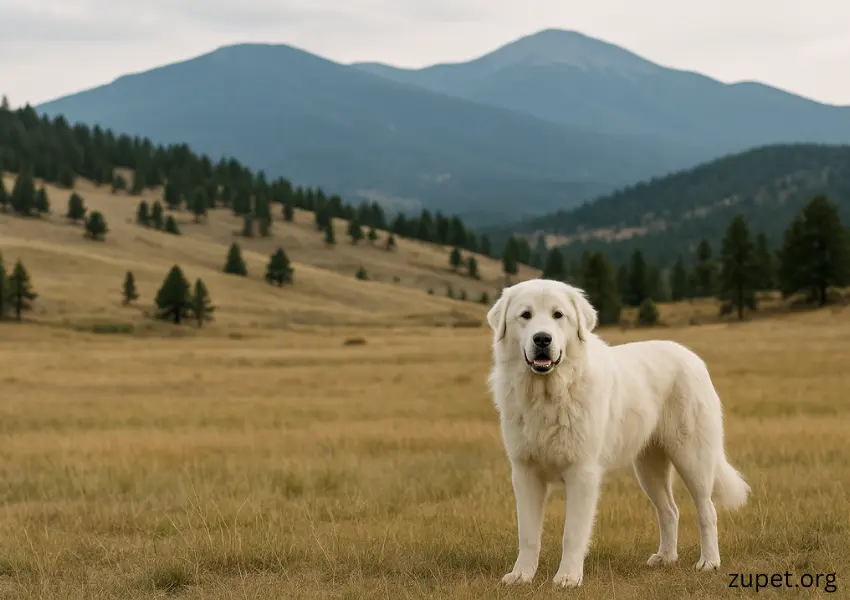
Temperament and Behavior:
Among the Colorado Mountain Dog’s most enticing qualities is its temperament. One is familiar with their calm, serene, confident attitude. Great cow guards, these canines are always alert and aware of their surroundings. Still, they just act forcefully when they feel threatened.
Their defensive character also permeates the creatures they guard. With these canines around, goats and sheep, for instance, feel safe since they form a tight bond with the herd and fit perfectly. Strong, devoted relationships between family members are created by this breed, which is also quite tolerant and gentle with children. Though they have a placid exterior, they are constantly on high alert, watching for their area and loved ones.
Care Requirements:
Colorado Mountain Dogs have a thick coat, which requires regular maintenance, but their care is relatively basic. While weekly brushing is crucial, in the summer, you will have to brush them daily to help shed the thick undercoat. They also demand regular care, including tooth brushing and nail clipping, if we are to keep them healthy.
Being big dogs, they require considerable room to explore and play. Though they are great working dogs, they are not fit for city life since they might not have the room needed to keep active. These canines are ideal for a farm or large homestead with loads of outside space.
Their regimen also includes regular ear examinations, parasite prevention, and sporadic bathing. Many of these dogs are white; thus, maintaining clean and healthy coats is crucial to avoid dirt and parasites damaging their skin.
Are They Good Family Dogs?
Indeed, Colorado Mountain Dogs are excellent family pets since they are known for their soft and friendly attitude. Strong ties with family members help these dogs to be especially patient and protective of children. Their quiet nature lets them live in harmony with others, and they enjoy helping out in family events, from simple lounging next to you to outdoor games.
Although they are big and strong canines, their pleasant attitude guarantees they are not aggressive unless they feel a real threat. For households that include children, this makes them reliable friends. But given their weight, it’s important to monitor interactions between small children and these dogs, particularly during the puppy age when they are more agitated.
Colorado Mountain Dogs are, all things considered, caring, devoted family members as well as excellent guards. Their harmony of calm demeanor and protective instincts makes them ideal for family life, particularly in settings with lots of room for their roaming and play.
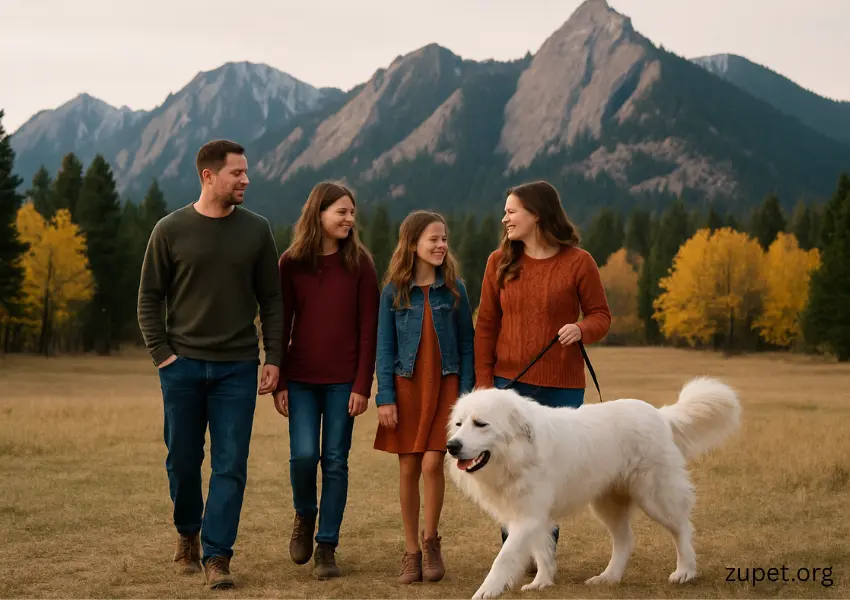
Training and Socialization:
Colorado Mountain dogs, like all dogs, need early socialization and appropriate training. Although they are independent and naturally protective, they may be taught to follow directions and interact peacefully with other animals. Their intelligence and eagerness to comply make training simpler than with some more stubborn breeds.
Particularly if you intend to have them interact with guests or other animals, socializing is vital. Although they are sociable, improper socializing could cause shyness or overprotectiveness. With this breed, positive reinforcement methods seem most effective.
Cost and Breeders:
A Colorado Mountain Dog normally runs between $900 and $2,000, depending on the breeder and the dog’s ancestry. These dogs look great, but breeders who are passionate about the breed may nurture them for certain purposes. The cost represents the care and attention required to raise these dogs such that they possess the correct temperament, health, and guarding capacity
Getting a Colorado Mountain Dog requires research to identify a reliable and moral breeder. These dogs are selected for their temperament, health, and guarding abilities; working with a breeder who understands the demands of the breed is necessary to get a healthy, well-adjusted dog.
Pros and Cons:
Colorado Mountain Dogs have their own set of benefits and drawbacks, much as every breed has.
Pros:
- • Excellent livestock guardians
- • Friendly and patient with children
- • Less likely to bark excessively compared to other LGDs
- • Strong bonds with family members and animals they guard
- • Well-suited to small acreage farms and homesteads
Cons:
• Large dogs, requiring plenty of food and space
• May still bark when guarding, especially when they sense a threat
• Not well-suited to city living
• Need for consistent grooming and maintenance, particularly during shedding season.
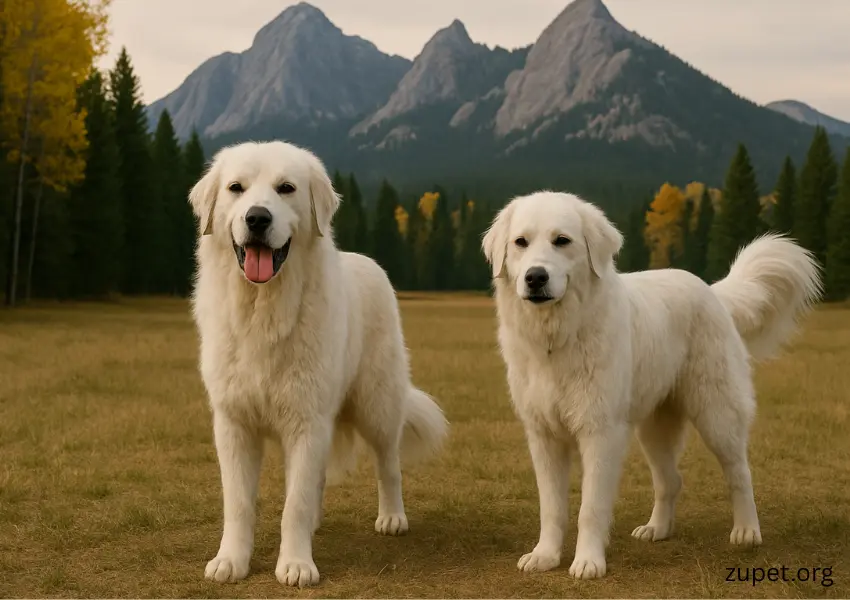
Conclusion:
For homesteads and family farms alike, the Colorado Mountain Dog is a first choice for dependable and affectionate livestock protectors. These dogs are great additions to homesteads, ranches, and eco-tourism projects because of their peaceful but protective demeanor as well as their good adaptation to tiny sites. Although they do call for lots of room, time, and persistent training, the benefits are many and include constant loyalty, loving companionship, and unsurpassed cattle protection. The Colorado Mountain Dog could be the ideal breed for you if you’re ready to spend money on a dog that not only does committed work but also becomes a beloved part of your family.
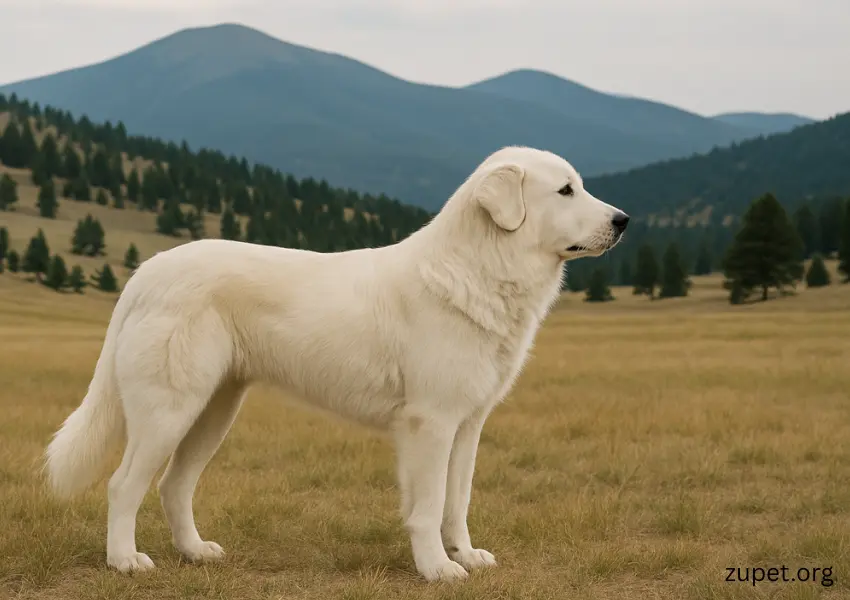
2 thoughts on “Colorado Mountain Dog: The Complete Guide”